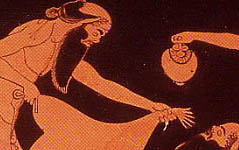Gallery of Philologists
Varro
0116-027
Marcus Terentius Varro was the pupil of the first Roman philologist, the Stoic Lucius Aelius Stilo. Varro also studied philosophy with Antiochus of Ascalon in Athens. Stilo was himself no slouch. He interested himself in antiquities and in authenticity questions therefrom arising, in grammar and etymology, and in literary criticism. He produced editions of the early Latin writers Ennius and Lucilius, and commented on the archaic language of the first Roman law code, the Twelve Tables, which had become something of a linguistic curiosity in his time. It was Stilo who first attended to the 130 plays then attributed to Plautus, reducing them to a more realistic probable canon of 25. Cicero, who mentions at one point that the Twelve Tables were memorized by students in his youth, but were legally inoperative, was another of Stilo's pupils. The crossing of the line between the familiar recent and the unintelligible remote, in the Roman consciousness, shows itself in both men. It is the obsolescence of the once obvious that has a tendency to promote philological consciousness. So it had been also with Zenophon and other glossarists of Homer, and with various students of the Chinese classics by the early 03rd century.
Varro himself went beyond his master in nearly all directions, literary as well as philological. His fame in our time rests on his work in further distinguishing, among the plays of Plautus, an inner 21 which on stylistic grounds could be firmly attributed to him. We cannot now check his conclusions by repeating his distinction process, since posterity has so thoroughly accepted Varro's result that the rest of the former Plautine corpus has vanished. We can but nod, unless it be desired to investigate whether the 21 plays are at least in the same style as each other.
Varro rose to be a Roman praetor. Late in his life he fought for Pompey in Spain (049) but was pardoned by Caesar and made director of the future public library of Rome (047), but then outlawed by Antony following the death of Caesar (043). He spent the remaining 16 years of life in study. By 038, when he was 78, it was said that he had edited 490 books. A list of 51 of his original works, most of them from his earlier years, is preserved in a later catalogue. They cover virtually the whole range of learning: exemplary biography, dialogues on the education of children, a social history of the Roman people, a small encyclopedia of the learning necessary for the gentleman, and a gigantic collection of 150 humorous essays, written between 081 and 067, satirizing luxury and other foibles of his time.
Of all this original work, only two things survive in more than tattered form: Books 5 and 6 plus parts of Books 7-10 of the original 25 Books of De Lingua Latinae and all of Rerum Rusticarum Libri III. The latter title will remind many of Vergil's Georgics, and will suggest the mixture of urban patronage and rural reminiscence which becomes part of the European humanist tradition; it turns up again in Poliziano.
2 Oct 2006 / Contact The Project / Exit to Gallery Index Page
